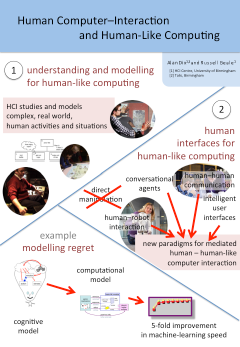Abstract
The poster will address the broad way in which human–computer interaction as a field relates to the Human Like Computing theme.
1) Understanding Human Behaviour in Complex Situations. One aspect of HCI research is understanding how people operate perceptually, cognitively and physically. Real use is complex and situated, whereas much of traditional psychology necessarily focuses on abstracted and simplified behaviours. This means that HCI research has to synthesise multiple psychological and social theories, or perform more fundamental experiments and studies in more realistic settings. This grounded complex understanding seems to be very valuable to the human-like computing vision.
2) When Human-Like Computing meets Humans. Many applications of human-like computing will include some sort of interaction with real humans. That is there are direct HCI questions arising from this. Some of these are about direct user interaction with human-like computation, some about the broader societal and ethical implications (connecting into politics and philosophy). This intersects with many existing areas of HCI, for example, human–robot interaction, or work on using rules of human communication to guide human–computer error recovery dialogues. In addition, as computers become better at being like humans this opens up new areas of study.
As an example of the first of these, a cognitive model of regret was created which included aspects of low-level conditioned behaviour, emotion, imagination and counter-factual reasoning. This was validated using a computational model and as an 'accident' of this it was found that adding am artificial regret module could speed up machine learning (in terms of presented cases) by an order of magnitude.
|
